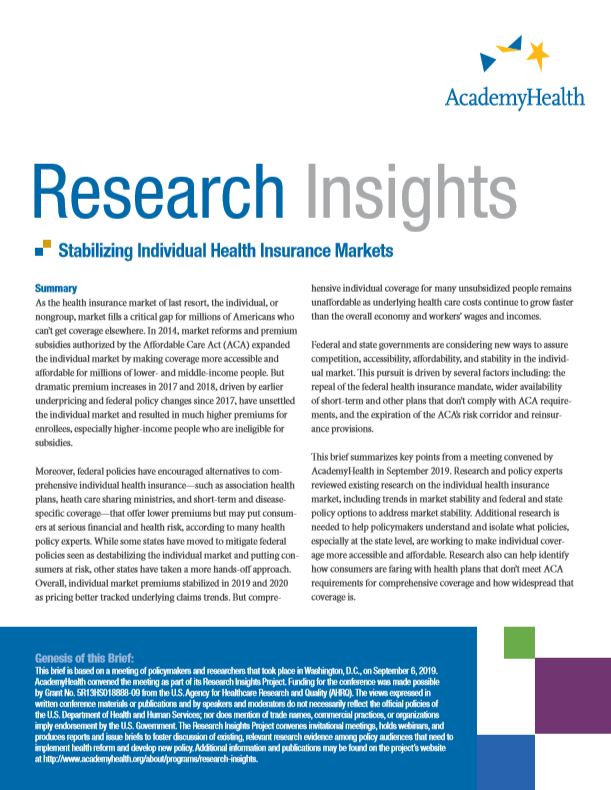
Stabilizing Individual Health Insurance Markets
This issue brief is a synthesis of the presentations and discussions at a September 2019 meeting, along with relevant background from the gray and peer-reviewed literature. The discussion was off the record, so comments are paraphrased and without attribution. The brief is part of the Agency for Healthcare Research and Quality-funded project Research Insights, managed by AcademyHealth.
With the cost of individual health insurance premiums on the rise, federal and state governments are considering new ways to assure competitive, accessible, and affordable plans in the individual market.
In September 2019, AcademyHealth convened a conference of about 30 policy analysts and public officials to review and discuss research related to the individual market and identify the effects of a range of federal and state policies intended to strengthen the individual market’s infrastructure. Key takeaways from the discussion include:
- Despite changes the Trump administration made to weaken the Affordable Care Act (ACA) market reforms, such as cutting funding for navigators to assist consumers with shopping for coverage and eliminating cost-sharing reduction (CSR) payments to insurers, the individual market is stable.
- The Trump administration elimination of CSR payments made the market more affordable for lower-income people because subsidies increased as premiums increased, causing silver plans to shoulder the cost of higher premiums most effecting rural markets the most.
- When it comes to the individual marketplace, more research is needed in order to understand the dynamics of the marketplace and to monitor a plethora of non-ACA-compliant insurance plans.
- Future research is needed in order to understand what state level policies make coverage more accessible and affordable.
Funding for this conference was made possible by Grant No. 5R13HS018888-09 from the U.S. Agency for Healthcare Research and Quality (AHRQ). The views expressed in written conference materials or publications and by speakers and moderators do not necessarily reflect the official policies of the U.S. Department of Health and Human Services; nor does mention of trade names, commercial practices, or organizations imply endorsement by the U.S. Government. The Research Insights Project convenes invitational meetings, holds webinars, and produces reports and issue briefs to foster discussion of existing, relevant research evidence among policy audiences that need to implement health reform and develop new policy.